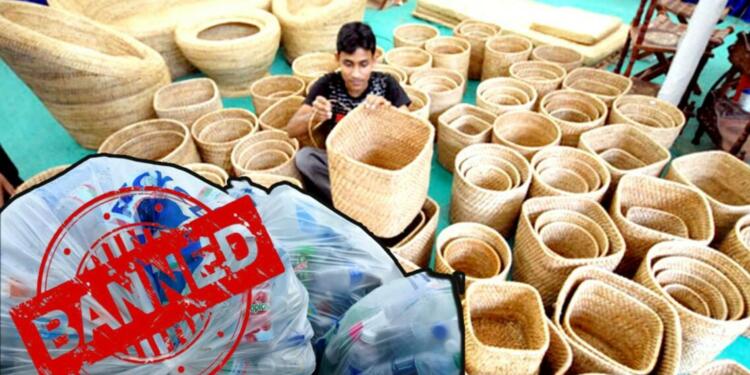Plastic is a termite that is slowly swallowing our environment. Over the years, we have been polluting the environment by using plastic indiscriminately in our everyday lives. Plastic is not only harmful to the environment, but it also causes great harm to our health. So, getting rid of it is the only option possible.
India took a big step in this direction and in the month of July itself, single use plastic was banned by government. However, the jute industry is also getting a benefit from the plastic ban. Almost on the verge of extinction, the jute industry seems to be alive once again.
The use of single-use plastic was banned in India on July 1, 2022. Four years ago, Prime Minister Narendra Modi took an oath to phase out the use of single-use plastic in the country. The manufacture, storage, import, distribution, sale and use of 19 items of low utility and high waste generation were completely banned in all states with effect from July 1, 2022.
Indian jute industry is in the process of being revived
On the other hand, ever since this single use plastic has been banned, there is a boom in the business of jute once again. In fact, the jute industry has struggled a lot in the last few decades. The period before partition was the time when India and especially Bengal used to have a monopoly.
Along with raw jute, ready-made sacks were sent to different countries. This is the reason why jute is also called ‘golden fiber’ or ‘gold fiber’ in India. The jute industry had been contributing significantly to the Indian economy as well. But then slowly this industry started reaching towards its destitution.
This is because there were many less expensive options in the market to compete with it. At the same time, farmers had also started turning to other crops in its place and at the same time there was a lack of investment in the mills. Even then, Jute did not give up. It was constantly trying to make its place in the market. Now the world is looking for an alternative to plastic and in such a situation the jute industry seems to be that option.
Raghavendra Gupta , a top official of the Indian Jute Mills Association, a trade body in Kolkata, said, “Natural is becoming fashionable now. There is nothing more eco-friendly than jute.”
Also read: India bans Single-Use Plastic
Increasing demand for jute
According to Raghavendra Gupta, the global jute bag market is expected to grow from $2.3 billion in 2021 to $3.38 billion in 2026. Shopping bags accounted for nearly a quarter of the $400 million India exported in 2021, and the country’s jute bag exports have more than tripled in the past five years. The US is the largest export market for Indian jute products, growing by 25.5% last year to nearly $100 million.
Also read: Say No to Plastic Bags : No to plastic equals to Yes to healthy life
Prime Minister’s appeal
According to experts, diversifying the products of the jute industry will go a long way in opening up the market for its exports. This good news is coming about the jute industry and in the meantime the government had extended the mandatory jute packaging till December 30, 2022.
According to the notification issued by the Ministry of Textiles a few days ago, the limit of mandatory jute packaging was increased. Under these rules, it is mandatory to use 100% jute package in food grains. At the same time, up to 20 percent jute bags should be used for sugar. Due to this the Jute business has got further encouragement by the government.
The government is fully engaged in efforts to revive the jute industry. During his ‘Mann Ki Baat’ program in September, Prime Minister Narendra Modi had appealed to the countrymen to buy more indigenous goods during festivals and use jute bags instead of plastic bags. Hope Modi government to have yet another success by the revival of the jute industry.
Support TFI:
Support us to strengthen the ‘Right’ ideology of cultural nationalism by purchasing the best quality garments from TFI-STORE.COM























